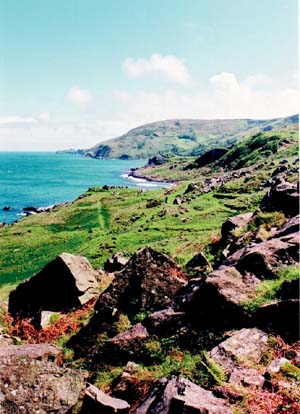| 2004 |

|
YEAR BOOK |
Geological Survey of Northern Ireland
|
Towards a sustainable future
|

However, although we all welcome the benefits provided by quarried and mined materials, we rarely welcome new mineral developments near our homes. Many still view the extractive industry as a dirty business, but this is now being challenged by government and industry. The UK Government strategy on sustainable mineral development stresses maintenance of our levels of economic growth, but in a manner that ensures effective protection of the environment. This attitude is shared by the minerals industry, which continues to minimise its environmental impact � the minerals industry in the UK plants more trees than all other sectors except the Highways Agency.
Mineral production remains a key economic activity in Northern Ireland, which produces more aggregates than any other region of the UK (worth almost �75 million). Furthermore, when you include the industries that directly rely on mineral production (e.g. construction), the total value to the Northern Ireland economy rises to approximately �375 million. Therefore it is important that this industry continues, and the Geological Survey of Northern Ireland (GSNI) is working with the companies in Northern Ireland to ensure the most sustainable approach. The GSNI is also involved in an educational programme with colleagues from the British Geological Survey and the Quarry Products Association to highlight the positive effects of the minerals industry and the great strides it is taking with regards to environmental protection.
Northern Ireland has a rich mineral heritage, and the GSNI is working to ensure that today's mineral extraction sites can be developed in the future into amenities like Murlough Bay (Co. Antrim), Scrabo and Castle Espie (both Co. Down), all three of which are former sites of mineral production. If you want to know more about the work of the GSNI, or other issues related to sustainable mineral development, please contact Miller O'Prey at the address below.
Contact: Geological Survey of Northern Ireland, Colby House, Stranmillis Court, Belfast, BT9 5BJ;
E-mail: [email protected]